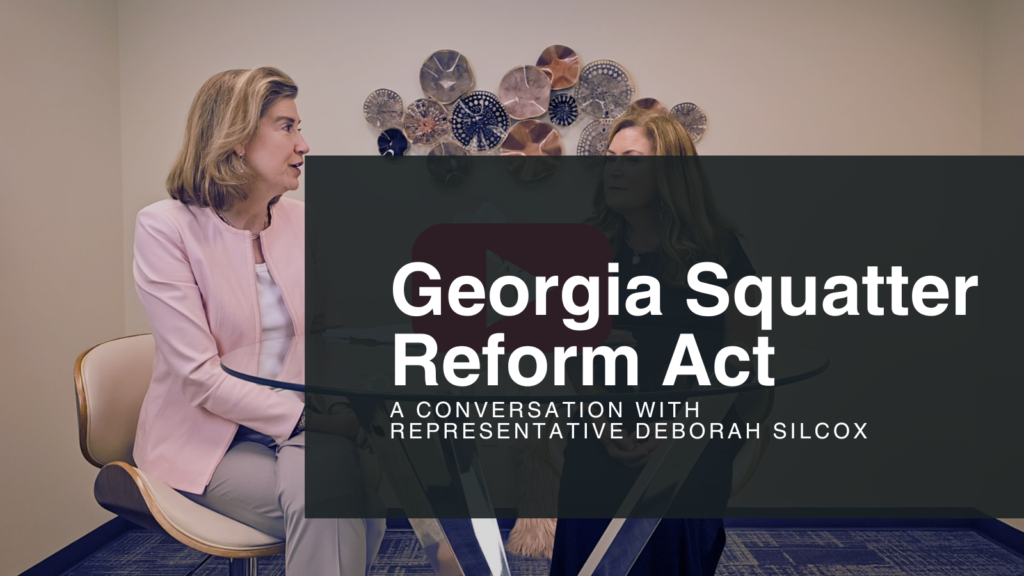 In recent years, the issue of squatters occupying vacant or abandoned properties has become increasingly problematic in Georgia, particularly in the Atlanta metro area. To address this growing concern, the Georgia legislature has enacted the Georgia Squatter Reform Act, a law that provides new tools and protections for property owners facing this challenging situation.
In recent years, the issue of squatters occupying vacant or abandoned properties has become increasingly problematic in Georgia, particularly in the Atlanta metro area. To address this growing concern, the Georgia legislature has enacted the Georgia Squatter Reform Act, a law that provides new tools and protections for property owners facing this challenging situation.
In a recent interview, I had the pleasure of sitting down with Representative Deborah Silcox, who played a pivotal role in the creation and passage of this important legislation. We discussed the motivations behind the law, how it came to be, and what it means for property owners across the state.
Understanding the Georgia Squatter Reform Act
The Georgia Squatter Reform Act was born out of a clear need to protect property owners from the frustrating and often expensive process of dealing with squatters. Prior to this law, property owners had limited options to reclaim their properties, often facing long and costly civil lawsuits with no guarantee of a quick resolution.
Representative Silcox explained that during her 2022 campaign, she encountered several abandoned properties in Buckhead that appeared to be occupied by squatters. This experience, coupled with numerous complaints from her constituents, highlighted the urgent need for legal reform.
Under the new law, squatting is classified as a misdemeanor offense rather than a civil matter, allowing for faster and more effective action by law enforcement and the courts. Here are some key points discussed in the interview:
- New Legal Framework: The law merges elements of civil and criminal law, making it a criminal misdemeanor for individuals to occupy a property illegally. This shift allows for quicker interventions by law enforcement.
- Streamlined Process: If a property owner suspects squatters, they can contact local law enforcement, who will issue a citation to the squatters. The squatters then have three days to provide proof of a legitimate lease or payment arrangement. If they cannot, the magistrate court can order immediate eviction.
- Companion Legislation: Alongside the Squatter Reform Act, Representative Silcox also introduced House Bill 1203, which allows landlords to hire off-duty police officers to enforce eviction orders, helping to speed up the eviction process in counties where there is a significant backlog.
The Impact on Georgia’s Real Estate Market
The introduction of this law is particularly significant for Georgia, a state that has recently seen a rise in squatting cases, with Atlanta reportedly having the highest number of squatters in the nation. During the interview, Representative Silcox noted that many property owners, especially those with vacant properties, had been hesitant to list their homes on the market out of fear of attracting squatters. This fear often led to properties being sold off-market at lower prices, affecting the overall real estate market.
With the Squatter Reform Act now in effect, property owners have greater confidence in protecting their investments. This, in turn, could lead to an increase in available listings and a more robust real estate market, as homeowners feel safer putting their properties up for sale.
What Property Owners Need to Know
For property owners, particularly those with vacant or rental properties, understanding the provisions of the Georgia Squatter Reform Act is essential. The new law provides a clear and enforceable path for reclaiming properties from illegal occupants, saving time, money, and potential legal battles.
Key Takeaways:
- Act Quickly: If you suspect someone is squatting on your property, contact local law enforcement immediately.
- Provide Documentation: Be prepared to provide documentation proving ownership of the property.
- Legal Support: While the new law simplifies the process, consulting with an attorney, especially in complicated cases, is always advisable.
Final Thoughts
The Georgia Squatter Reform Act represents a significant step forward in protecting property owners and ensuring the integrity of the state’s real estate market. As we continue to navigate the challenges posed by squatters, this new law offers a much-needed solution for quick and effective action.
To hear more about the Squatter Reform Act and its implications for property owners in Georgia, be sure to watch the full interview with Representative Deborah Silcox here.
If you have any questions about how this law might impact your property, or if you need assistance with real estate matters in Georgia, don’t hesitate to reach out. I’m here to help you navigate the complexities of the real estate market with confidence and peace of mind.
Angela Carpinella
Realtor and Real Estate Advocate
Cell: (404) 229-8528
Office: (404) 419-3500
Email: Angela.Carpinella@KW.com
Address: 804 Town Boulevard, Atlanta, GA 30319
Contact Me

